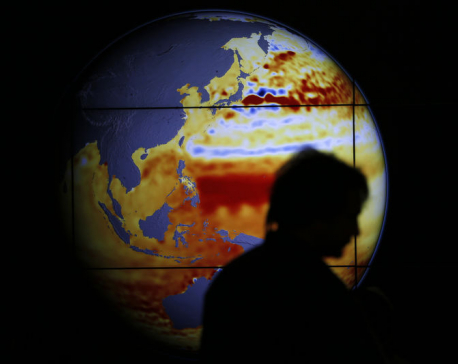
OR
Nepal to host int’l dialogue on climate change issues of mountainous countries
Published On: May 19, 2024 07:57 PM NPT By: Republica | @RepublicaNepal

KATHMANDU, May 19: A mountainous country, Nepal, has for long been raising its voice at international forums on the impact of climate change on the Himalayas.
As a result of this, the UN Conference on Climate Change (COP-28) held last year for the first time incorporated in its decision the impact of climate change on the Himalayas, and has been emphasizing the effective implementation of the responses to lessen this impact.
In this connection, Nepal is hosting an 'international dialogue' on May 22 and 23 in Kathmandu to anchor this issue internationally under its own leadership.
Experts from 23 countries are participating in the two-day event that aims to strengthen coordination and prioritize mountain-centric priorities and actions within the broader context of climate change. The theme of the dialogue is, “Mountains, People, and Climate Change”.
More than 200 delegates from the mountainous countries including Nepal and the island nations, the international community, development partners, the international non-governmental organizations, the private sector as well as the representatives of civil society will take part in the dialogue.
Joint secretary at the Ministry of Forests and Environment, Dr Maheshwar Dhakal said that the objective of this dialogue on climate change issues is to prioritize and strengthen in a coordinated way the works related to the mountain ecosystem based climate resilience.
"Climate change is a global agenda and mountainous countries like Nepal have been facing more problems related to it. We have prepared to establish the issue of adverse impact of climate change on mountainous countries under Nepal's leadership, further internationalizing this topic through the dialogue," he said.
Joint Secretary Dhakal also said the dialogue aims to enhance the negotiating capacity of mountainous countries on climate change and to exert pressure on the international community to mobilize sources required for climate adaptation and reduction of climate change impacts.
"Climate change incidents are increasing day by day. They are comparatively more in the mountainous and hilly regions. Therefore, this international dialogue will also be useful for raising institutional voice in a stronger manner," he added.
The chairperson of the UNFCCC Subsidiary Body for Implementation (SBI) and Subsidiary Body for Scientific and Technological Advice (SBSTA) will also attend the dialogue. Similarly, the representatives of the UNFCCC Secretariat and the representatives of UN agencies, the World Bank, the Asian Development Bank and other agencies will also participate in the discussions.
The Dialogue has the goal of forging collaboration among the mountainous countries and the stakeholders in the programs under the UNFCCC.
Chief of the Ministry's Climate Change Management Division, Joint Secretary Dr Buddhi Sagar Poudel said this conference will help in understanding the issues of climate change impact in the Himalayan region and their solution at a deeper level.
"Our conclusion is that this Dialogue will contribute to integrate the expertise and experiences on the topic and also to develop mountain climate resilience strategy along with common resolve," Poudel added.
Prime Minister Pushpa Kamal Dahal is scheduled to inaugurate the Dialogue featuring nine sessions covering three major thematic issues. These sessions will focus on climate change science, mountaineering facts and data, measures for mountaineering resilience based on nature, and the exploration of potential sources and opportunities for the protection of mountain regions.
The Dialogue will delve into the impact of climate change, its crisis and risks, climate change policies for prosperity, climate change adaptation in local leadership, climate change justice, gender equality, and local concerns. Moreover, it will press for the promotion of investment in clean and green energy, climate finance accessibility, and the enhancement of international and regional partnerships to tackle climate change issues.
You May Like This

Agenda for Europe
AMSTERDAM – The European Union has spent much of the past decade managing crises, and has even faced a possible... Read More...

Climate change takes toll on French oyster farmers
Gulping down oysters has long been a favourite New Year's Eve ritual for the French, but as winters get warmer... Read More...

Pacific leaders seek U.S. return to Paris climate pact
SYDNEY, Sept 7: Pacific island nations declared climate change to be their “single greatest threat”, urging Washington to return to... Read More...






Just In
- NRB introduces cautiously flexible measures to address ongoing slowdown in various economic sectors
- Forced Covid-19 cremations: is it too late for redemption?
- NRB to provide collateral-free loans to foreign employment seekers
- NEB to publish Grade 12 results next week
- Body handover begins; Relatives remain dissatisfied with insurance, compensation amount
- NC defers its plan to join Koshi govt
- NRB to review microfinance loan interest rate
- 134 dead in floods and landslides since onset of monsoon this year











Leave A Comment